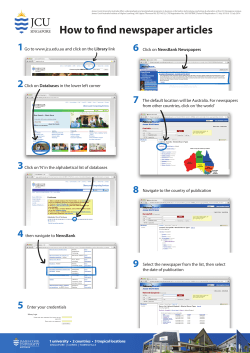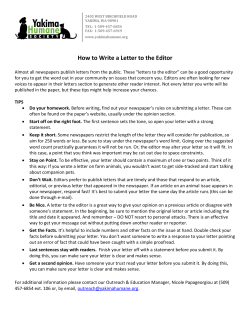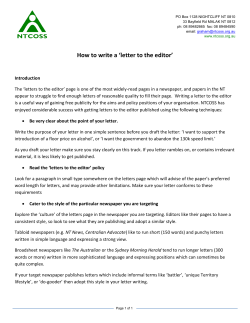
Spread the Great News!
April 2015 Background Sheet 1: Spread the Great News! Getting Local Media Coverage for 0.7% One of the actions we’re asking you to take this month is to use local media to spread the great news of the 0.7% bill becoming an act. You can write a Letter to the Editor or an Op-‐Ed and frame it either around democratic engagement; the bill as a campaign success story; or your pride at the UK’s commitment to, and leadership on, overseas aid (or another angle, if you have a different idea!). These are just a few of the great messages we can draw from this historic achievement, and sharing one or more of them with your fellow residents will hopefully support similar work in the future. This background sheet will give you tips and tricks on how to best work with the media, as well as a few key points and a call to action for each of the angles you might take. As always, let us know if you are successful in getting a piece in the paper – and let’s get writing! Top tips for working with the media • • • • Research the publication. There are a number of things that are helpful to know before sending off your piece, including: 1) the usual style of items the newspaper publishes (so you can match your tone accordingly), 2) when the paper goes to press (so you can get in well ahead of the deadline), and 3) who the best person is for you to send your piece to (this will change depending on the type of piece you decide to write). Doing a bit of background research will make you more likely to be successful in getting your article published, and should be easily done via the paper’s website. Include facts and stats. Solid facts will ensure that you come across as knowledgeable and well-‐informed, and will add credibility to your piece (see Background Sheet 2 for specific stats about UK aid). Have a local angle. A lot of local media will only publish something that is related to the area, so do bear that in mind. Titling it something like “Local Campaigning Group Celebrates 0.7% Success” and ensuring that you tie the piece back to your constituency and/or your group will make it more likely to be published. Tell the world! If you are successful in getting something published make sure you celebrate your success and amplify the message! Share it on Social Media and send it to us, so we can spread the word too. Types of pieces you can write 1. Letter to the Editor Most newspapers and magazines have a ‘letters’ page that gives readers the opportunity to express their views. Letters are widely read (particularly by local MPs and candidates) and provide a good opportunity to discuss your issues. Check your paper’s letters page or website for guidelines on how to submit a piece, as these vary. However, most newspapers will require the letter to be no more than 500 words, so keep it short, sweet and to the point. Consider ending your piece with a Call to Action as well – get your fellow constituents out there supporting UK commitment to aid! 2. Op-‐eds Most newspapers print opinion editorials (op-‐eds) or guest columns. An op-‐ed is an expression of opinion rather than a news item. Although style varies among different newspapers, an op-‐ed tends to be lively, provocative and sometimes controversial. Op-‐eds are usually 600 to 1,000 words long. If possible, speak to the person who is responsible for making decisions on op-‐eds to alert them that you intend to submit one and briefly explain the importance of the issue. You can find the contact details for the publication on the newspaper website or in the printed paper itself, often on the letters page. You will most likely need to speak to the ‘editorial desk’ although the terminology varies depending on the publication. Here are a few further tips for op-‐eds: a. Scan your paper’s opinion pages to get a sense of what people are and are not writing about, and use this to inform your choice of angle (see below). b. Get in touch with how you personally feel about the act and use examples from your own experience; this is an opinion article and as such readers are expecting a personal touch. c. Similar to a letter, consider ending your op-‐ed with a Call to Action; this will not only inspire others to campaign but also ensure there is a solid purpose to your piece. d. Send your op-‐ed to the paper along with a covering letter (or email) explaining why the op-‐ed is timely and of interest to the readers of the publication. If you need help with this letter let us know. e. Follow up on your submission by phone if you have not heard back within one week. Explain that if this newspaper does not wish to publish the op-‐ed you would like to submit it to other publications and ask when they will make a decision about whether to publish it. If your op-‐ed is not published by the first newspaper you send it to, consider sending it to an alternative publication. Staying Neutral We’ve now entered the short campaign (meaning Parliament has dissolved and all candidates – including your (now former) MP -‐ are officially part of the General Election). So it remains as important as ever (if not more important) to maintain political neutrality. We’ve said it before, but it bears repeating: as a charity, RESULTS UK and our volunteers are not allowed to show party-‐political bias in our campaigning, or publicly endorse a political party. Please take care not to do so in your article, or any of your other campaigning for RESULTS. If you are at all worried about this, or would like some guidance, do get in touch with Dan, Tom or Anja in the office at any time. Key Messages for Your Piece Here are a few different angles you could take with your piece, and key aspects and calls to action for each. Choose the one that you like the most and have a crack at getting a piece published! 1. MPs have the power to save lives: that’s one of the reasons it’s so important that citizens get out and vote in May. -‐ This decision by Parliamentarians will ensure that UK aid continues to save lives every minute of every day, and will preserve the UK’s role as a leader on aid and international development -‐ Cross-‐party support for the bill (it was in all three major parties’ manifestos) made this happen: the outcome of MPs working together is change for the better. Politics can be positive! -‐ This shows that MPs have the power to change the lives of millions of people with their decisions, and citizens have the power to choose who gets to make these changes -‐ Call to Action: Make the choice of who gets the power to change our lives: get out and vote on 7 May (and make sure you’re registered right now!) 2. Campaigning matters: this bill is the product of 45 years of campaigning. It may have taken a long time, but Civil Society and grassroots campaigners make a difference! -‐ This bill would not have become an act had it not been for campaigners -‐ Campaigning has meant that millions of lives will be saved in the future through UK aid -‐ We should celebrate this success and use it as proof that campaigning works and must continue! -‐ Call to Action: Get campaigning! Join RESULTS UK today (include your group details and links to RESULTS’ website). 3. We should be proud of our government’s commitment to UK aid: the 0.7% law means we will continue being a world leader in development and save millions of lives every year. -‐ UK aid is life-‐saving and world-‐leading (check out this month’s Background Sheet 2 for statistics and figures showing the importance of UK aid) -‐ Enshrining 0.7% of GNI spending on aid will mean that the UK can continue to be a leader on the world stage in terms of aid and development -‐ UK leadership also inspires other nations to step up and take action to support global development -‐ Call to Action: Take to Social Media and show all candidates that voters in their constituency care about international development (consider including Sample Tweets – we can help with this too!)
© Copyright 2025









